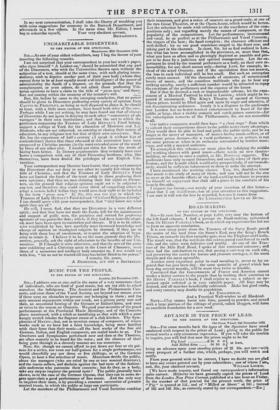UNCHARITABLE DISSENTERS.
TO THE EDITOR OF THE SPECTATOR.
But, Sir, before he came to the sweeping conclusion, that no power should be given to Dissenters professing every variety of opinion from CALVIN to PRIESTLEY, as being so well disposed to abuse it, he should at least, with a little more candour, have heard both sides of the ease. Perhaps while I am yet writing, he may have found out that all classes of Dissenters do not agree in denying to each other "community of ad- vantages" in their own institutions ; and that the sect to which the gentlemen composing the Trustees of Lady HEWLEY'S Fund belong, support a college -at York for the education of Ministers and Lay Students, who are not subjected, on entering or closing their course of education, to any religious test but that of their own conscience. Nor, Sir, has the experience of half a century (I speak it without fear of contradiction) shown that those educated at this institution have been surpassed as Christian pastors (in the most extended sense of the word) by those of any other sect. I would not claim for them the merit of having been better. In literary acquirements they certainly have ever borne a comparison with any of their Dissenting brethren, who, like themselves, have been denied the privileges of our English Uni- ' versities.
Your correspondent may likewise have learnt, that every sect amongst the Dissenters does not deny to any other its equally fair claim to the title of Christian; and that the Trustees of Lady HEWLEY'S Fund have not limited the funds of the trust solely to those prgfessing their own opinions; that they are men claiming their fair rights as Dissen- ters, on the ground that religious opinions ought not to be subjected to any test, .and therefore they could never think of compelling others to .adopt a certain belief before they would own their right to be included in the term "pious men." If, Sir, this was the NI-ay in which the Trustees of Lady HEWLEY'S Fund defined "Civil and Religious Liberty," I too should agree With your correspondent,,that "they know not what spirit they are of."
He will, I trust, find, that they are Dissenters in a very different spirit ; and that they have not made the funds, left for the maintenance and support of godly men, the premium and reward for proftssiv opinions of any particular date ; which, if they had been honestly adopt- ed, must have been open to conviction and change. If it is to be other- wise established by law, how carefully must increased knowledge and change of opinion on theological subjects be shunned, if they are to bring with them loss of emolument, or require the adoption of hypo- crisy to retain it. I believe it to be on the same grounds that the his senters, generally, ask the right of admission to the benefits of our Uni- versities. If I thought it were otherwise, and that the acts of the party now exhibiting such a Christian spirit in the Court of Chancery, were those of a numerous and intelligent body amongst us, I too would say with him, "let us not be trusted till time has better fitted us for power."
I remain, Sir, yours, .
Manchester, 25th December 1833. SIR—As one of your oldest subscribers, may I beg the favour of your inserting the following remarks.
Tam not surprised that your correspondent in your last week's paper, who signs himself " A Looker-on," should be astonished that any part of the Dissenters, who wish the Universities thrown open without the subjection of a test, should at the same time, with such glaring incon- sistency, wish to deprive another part of their own body (whom they cannot deny to be at least equally moral aid intelligent) of the power of administering the funds of a bequest, on the grounds that they the complainants; or even others, do not admit those professing Uni- tarian opinions to have a claim to the title of "pious men," and there- fore not coming within the meaning of the testator's will.
A DISSENTER, BUT NOT A SECTARIAN.
















 Previous page
Previous page